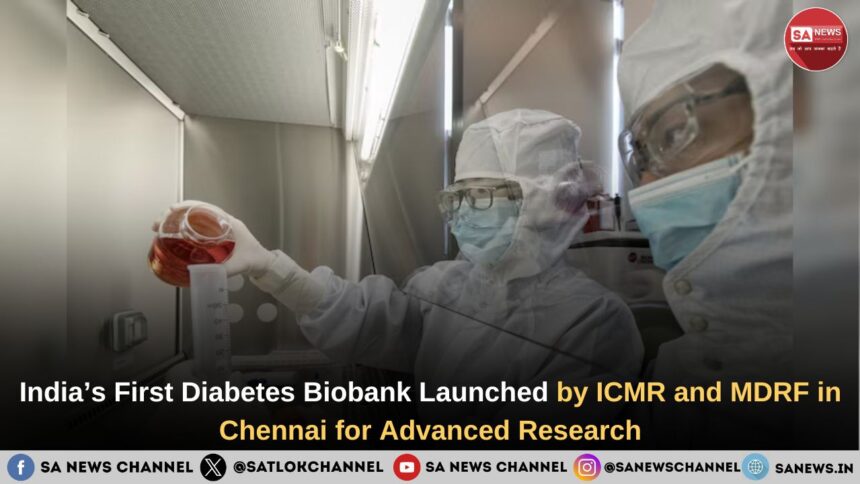The Indian Council of Medical Research (ICMR), in collaboration with the Madras Diabetes Research Foundation (MDRF), has launched India’s first diabetes biobank in Chennai. The biobank is a crucial resource aimed at enhancing scientific studies and treatment innovations for diabetes.
ICMR and MDRF have established India’s first diabetes biobank in Chennai to collect and store biospecimens to aid research, early diagnosis, and personalized treatments for diabetes. This biobank is set to advance the fight against diabetes in India.
Biobank dedicated to diabetes Key Points:
1. India has established its first biobank dedicated to diabetes research.
2. Biobanks play a crucial role in the development of treatments for chronic conditions like diabetes.
3. The biobank can leverage millions of diabetes samples already collected by various organizations, enriching its research potential.
What is a Biobank?
A biobank is a repository that collects, processes, stores, and distributes biological samples such as blood, tissues, urine, saliva, and DNA. These samples are essential for medical research, enabling scientists to study diseases and develop new treatment methods.
Purpose of this Biobank
The Chennai diabetes biobank is designed to collect, process, and store biospecimens for advanced research. Its primary goals are to identify novel biomarkers for the early diagnosis of diabetes and develop personalized treatment strategies tailored to the Indian population.
What Samples Do We Already Have?
The biobank is already holding valuable samples from two major ICMR-funded studies:
1. ICMR-INDIAB Study (2008–2020):
This study involves 1.2 lakh participants, including 33,537 urban and 79,506 rural residents across 31 states and Union Territories.
2. Registry of People with Diabetes in India with Young Age at Onset (Since 2006):
This registry focuses on diabetes cases that begin at a young age, with around 5,000 participants enrolled to date.
How Can This Help Humanity?
This initiative is instrumental in addressing early-onset diabetes and streamlining future research efforts. With a rich collection of samples, this biobank will support the development of personalized treatment strategies, significantly benefiting public health and improving quality of life for millions.
What More Can We Do Beyond Scientific Advancements?
When scientific solutions seem limited and even doctors cannot provide the answers we seek, we often face moments of helplessness. It is in these times that we recognize the deeper truth: only God has the power to truly help us. Sant Rampal Ji Maharaj sheds light on this, explaining that, in earlier Yugas, God was actively involved in helping people. In Kaliyuga, however, due to spiritual decline and misguided practices, we are disconnected from this divine assistance.
Spiritual Leader Sant Rampal Ji Maharaj offers the correct way to worship, giving true mantras that can transform every life. These sacred chants help overcome challenges, from financial troubles to physical ailments. Millions of His followers have experienced remarkable changes through this divine practice.
To learn more about His mission and vision for a healthy, drug-free and dowry-free society, visit www.jagatgurutatavdarshisantrampaljimharaj.org and watch His daily Satsang from 7:30 to 8:30 PM on the Sadhna Channel.
FAQS on Diabetes biobank
1. Can anyone donate samples to a biobank?
Sample collection is based on specific requirements or through consented donations, which contribute to various research projects.
2. Are there other biobanks in India?
Yes, there are many biobanks in India, but this is the first one specifically focused on diabetes research.
3. Who manages the diabetes biobank in Chennai?
The biobank is jointly managed by the Indian Council of Medical Research (ICMR) and the Madras Diabetes Research Foundation (MDRF).
4. For what kind of diseases can biobanks be helpful?
Biobanks aid research on a wide range of diseases, including diabetes, cancer, cardiovascular conditions, and genetic disorders, among others.
5. Why is a biobank for diabetes research important?
Diabetes affects millions globally. A dedicated biobank for diabetes allows for early diagnosis, a deeper understanding of the disease, and the development of more effective treatments.









